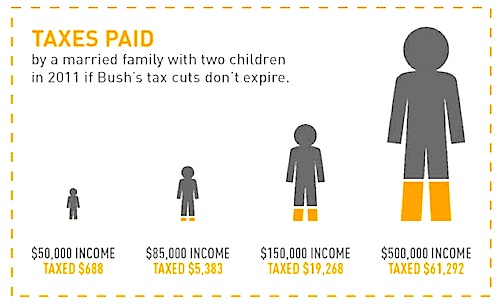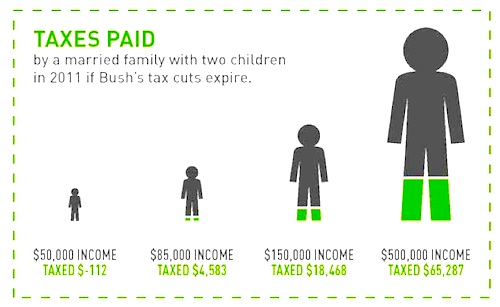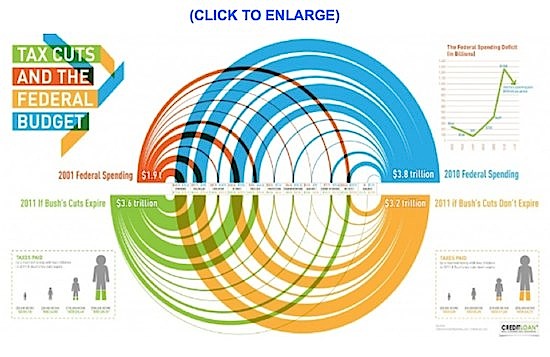While the following infographic on the subject of the Bush tax cuts made me somewhat dizzy and made my eyes spin, I thought it was interesting, nonetheless. I picked it up from CreditLoan.com and thought it brought out some talking points and big questions: how do these tax cuts affect our personal financial situation, and what kind of impact will it have on government spending?
This is a rather pretty picture, but you may want to expand it to make better sense of it. You can say that these tax cuts are matters of contention and debate. Nobody is entirely satisfied if you look at our tax issues piecemeal. The information and data depicted here represent the government tax relief efforts which occurred in 2001 and 2003, and which then expired by the end of 2010. President Obama then signed some extensions for these cuts very recently.
Bush Tax Cuts Extension: How Will This Affect Us?
Some interesting notes from the infographic:
#1 How much tax will a married couple with 2 children pay if the Bush tax cuts DON’T expire?

#2 How much tax will a married couple with 2 children pay if the tax cuts DO expire?

Effects of the Bush Tax Cuts on Households
The general claim is that tax cuts are good because they offer households more disposable income in order to spend more and to invest more. But they are detrimental to the economy in the long term because the deficit won’t be paid down. Then there’s that whole matter of whether tax benefits should not apply to the wealthy or whether everyone should benefit.
President Obama recently passed an extension for these cuts that will be in effect for another couple of years. But as I’ve been reading, it appears that the true effects of a cut aren’t as pronounced for the “rich” (who are recognized as joint taxpayers who have a $250,000 annual income or single taxpayers with a $200,000 annual income) as they could be, because of the parallel tax known as the AMT. If you fall in the income range of $75,000 to $600,000 then you may not really have seen much of an effect on your tax situation because of the Alternative Minimum Tax. The Tax Policy Center reports that 75% of taxpayers who make between $250,000 and $500,000 per year will be left with only a third of the tax cuts, once all is said and done. In the past, “those people really got clobbered,” says Roberton Williams, a TPC senior fellow. “On average, they lost 63% of their Bush tax cut.” More of this here.
So basically, these cuts aren’t going to save you all that much. The amounts bandied around that a typical family could save, thanks to the extension, amount to something like $4,000 or $5,000 a year. So if you’re already “wealthy”, it may not change your life or make much of a difference to you, but we sure go through a lot of hoops, and a lot of hand-wringing and head-bashing to figure this all out and arrive at this point, thanks to our messy tax system.
Effects of the Bush Tax Cuts on the Government
Now as far as the effects of this legislation on government, pundits go back and forth on this as well. On one hand, less taxes will mean less money to reduce our burgeoning deficit. On the other hand, if these tax cuts expire, there’s the claim that government will simply have more resources to draw from and may use the funds for inefficient or wasteful programs.
So where do you stand on this?
Copyright © 2011 The Digerati Life. All Rights Reserved.

{ 3 comments… read them below or add one }
Great information on the impact of the Bush Tax cuts. Given all the controversy, you would have thought the impact would have been greater if the tax cuts were not extended. In reality, if the tax cuts had expired, the lower income folks would be taxed less and the rich would “only” be taxed a small amount more relative to their income, about $4K to $5K more annually.
I am not sure where I stand on this. Knowing that even the rich tend to spend to their means, $4K-$5K can be significant even for the rich. On the other hand, theoretically, taxing the non-affluent less would have been a good way to stimulate the pockets of those most in need. SVB, as you point out, it also would have allowed the U.S. to work on the deficit which is burdening our economy. I think proponents of the ending the tax cuts should have explained the impact on all groups better and then we could have had a more informed debate and the decision might be clearer to me. In the absence of clarity, people are reluctant to make changes.
The one thing in the bill that caught my attention was the cut in Social Security funding. The employee share of FICA will drop from 7.65% ro 5.65% for 2011 as a result of 4.2% being withheld for OASDI (Old Age, Survivors, and Disability Insurance, a/k/a Social Security).
So we take a program that is already on shaky ground and cut the funding further? Seems a bit odd to me. Then again, I don’t expect to get much out of Social Security when I retire, so I guess I’m not overly concerned. Even if the program still exists, I expect that the retirement age will be pretty high by the time I get to that stage of my life (still at least 30 years away).
@ Kosmo. I agree with you about the cut in the Social Security Payroll tax. The program is already projected to run out of money and now the funding is being reduced in an effort to stimulate the economy by immediately increasing take home pay for many workers. The expectation is that this cut is temporary for 2011 only and that the money will be reimbursed (the government would have to borrow about $112 billion to make Social Security whole). A well explained and publicized plan to ensure that Social Security will be reimbursed would go a long way to making me feel better, but as you say, do not rely heavily on Social Security for retirement, especially if you are years away from retirement. I like to think of it as “gravy”.
I was so interested in this issue, I wrote a blog post about the cut in Social Security pay roll tax/funding the other day:
http://www.consumermiser.com/2010/12/27/payroll-tax-cuts-will-lead-to-bigger-checks-but-social-security-takes-a-hit/